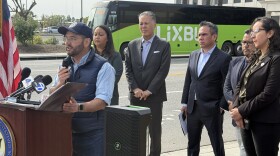Latino families in Riverside County are dealing with the mental health impacts of stepped-up immigration enforcement, advocates say. Community organizations are working to build safe spaces where residents can share their experiences, learn about their rights and connect with resources.
In Perris, the TODEC Legal Center works with Latino and immigrant residents who want to seek legal advice, housing assistance and food. At a recent workshop, business owners gathered to learn what to do if they encounter federal immigration agents.
Luz Gallegos, TODEC’s executive director, said the group tries to prepare families for difficult encounters. During the workshop, she tells attendees in Spanish to, “expect the worst because the government is taking money away from other places like social services and education and putting it into immigration enforcement.”
That warning reflects what many families are already feeling. Gallegos said merchants and street vendors in Latino immigrant communities face financial hardships alongside fears of arrest.
Gallegos noted that some Latinos they work with view receiving mental health support negatively, but she says safe spaces help break down stigma.
“We break it down to the community that it’s not that we’re crazy, but we’re going through trauma, and we’re calling it trauma,” Gallegos said.
Experts say those fears are taking a measurable toll. Psychologists warn that the threat of detention and deportation is driving stress, depression and post-traumatic stress in immigrant communities.
A new study from the University of California, Riverside, published in Psychiatric News, found that aggressive immigration enforcement is harming the mental health of children in mixed-status families. The research links detention, deportation and workplace raids to anxiety, trauma and emotional distress in children whose parents are undocumented. It also shows that both pre- and post-migration family separations disrupt children’s emotional development and academic performance.
Dr. Lisa Fortuna, one of the co-authors of the study, said parents often describe children who are too afraid to separate from them or even leave the house.
“Families cope better when their communities offer support,” Fortuna said. “It makes it more sustainable for kids to get to the other side, maybe less harmed, if they feel that they really have a community around them.”
Fatima Baldelomar, a clinical social worker, said cultural stigma still prevents many Latinos from seeking help. She has organized healing circles in Jurupa Valley, where families created mental health safety checklists.
“I noticed that people are not creating safe spaces for the community, because we don’t believe in mental health from the start,” Baldelomar said. “We think resilience is enough, but it’s not enough.”
Baldelomar says being honest with people — and letting them share without shame — makes a big difference. At the Jurupa Valley workshop, participants opened up about missing loved ones and feeling out of place.
“We need to understand that immigrant communities…we come together in some way. We're gonna come together,” said Baldelomar. “We're gonna support each other, and that’s when I noticed that, like nonprofits play that role, faith based organizations play that role.”
For some, being in a trusted safe space is a chance to speak openly. A street vendor, who asked to remain anonymous because of his immigration status, said he feels depressed after being detained but is grateful to TODEC for providing a space to share and learn about his rights.
“I know I have my family’s help, but I don’t want to be a burden to them,” he shared in Spanish. “We’re hoping this will pass, maybe things will change, who knows. But now we have to be attentive to what we learned here today to know how to act.”
Delilah Cruz, 9, said she feared her uncle would be deported after he witnessed several raids where he lives in Los Angeles. “We got scared for him because we didn’t know what happened,” Delilah said, “and we didn’t want him to get deported.”
Her mother, Linda Cruz, admits that she’s struggled to speak to her daughter about what’s going on, but she shared that TODEC's workshops give families knowledge and courage.
“One of the gentlemen inside said that with this information, he feels like he has more courage and more of a backbone,” she said. “And I think more than anything, our people, that’s what they need.”
Gallegos said processing these emotions can help families move forward.
“At the end of the day, it’s difficult,” she said. “Unidos, venceremos — united, we will overcome. Justice shows up. It might take a while, but justice always shows up.”
This story was produced as a project for the USC Annenberg Center for Health Journalism’s 2025 California Health Equity Fellowship.






